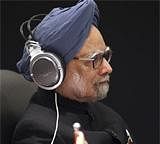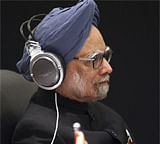

He also pushed for early completion of all formalities for implementing the India-ASEAN Trade in Goods Agreement, which was signed last year, by all the ASEAN countries. Speaking at the India-ASEAN Summit here which came out with a five-year 'Plan of Action' outlining roadmap for enhanced multi-faceted cooperation, Singh said India's economy was expected to witness a sustained growth rate of 9-10 per cent in the coming years, which would offer many opportunities for trade and investment.
"Our experience of implementation shows that we need to work very hard at all levels if we have to accelerate the pace of engagement as outlined in the Plan of Action," he told the leaders of 10 ASEAN members assembled here for the annual Summit.
The Plan of Action contains 82 points identified for implementation to tap the vast potential in various fields. Describing it as an "ambitious roadmap" for implementation of 'partnership of peace, progress and shared prosperity' between the two sides, Singh said it shows the desire to develop a multi-faceted India-ASEAN relationship.
"India believes that ASEAN is the core around which the process of economic integration of the Asia-Pacific region should be built," he said. "The conclusion of a Services and Investment Agreement will be an important step in our goal of comprehensive economic cooperation," the Prime Minister said about the pact negotiations for which are going on.
The India-ASEAN Trade in Goods (TIG) Agreement was signed in Bangkok on August 13 last year after six years of negotiations and it came into force on January 1 this year.
Seen as the world's largest FTA, covering a market of almost 1.8 billion people with a combined GDP of USD 2.8 trillion, the India-ASEAN pact envisages tariff liberalisation of over 90 per cent of products traded between the two dynamic regions.
Tariffs on over 4,000 product lines will be eliminated by 2016, at the earliest. Services and Investments could not be included in that free trade agreement as the two sides failed to reconcile their differences in time and it was decided to have a separate pact on these sectors.
The Prime Minister said India is expected to achieve a growth rate of 8.5 per cent during the current year and in the coming years, "we hope to sustain a growth rate of 9-10 per cent per year which will offer many opportunities for trade and investment."
He said his government has undertaken programmes for a massive transformation of rural India that is creating a huge and booming rural market for goods and services. Noting that the theme of the ASEAN Summit this year is the 'Vision to Action,' the Prime Minister said it is equally appropriate for the partnership between India and the 10-nation South East Asian grouping.
In his speech, Singh talked about the need for increased connectivity, movement of people, collaboration in science and technology and education besides security matters. "We invite many more tourists from the ASEAN countries to visit India to see the splendour of its rich cultural heritage," he said, noting that the text of the ASEAN-India MoU for Cooperation in Tourism has been finalised and ASEAN will soon establish its promotional chapter for tourism in Mumbai.
"As a concrete measure, I am happy to announce that we will extend our visa on arrival facility to nationals of Cambodia, Vietnam, Philippines and Laos with effect from January one next year," Singh said.
India already has visa-on-arrival scheme for some other ASEAN countries like Singapore, Malaysia and Japan.
The Prime Minister said India has always accorded high priority to the countries covered by the 'Initiative for ASEAN Integration' and hoped to upgrade the level of youth exchanges as well as establish vocational training centres in each of these countries.
Talking about connectivity, he said as a further measure to support the ASEAN Master Plan on Connectivity, India will offer 100 IT scholarships to each of the ASEAN countries over the next five years.
He said science and technology should be another focus area of India-ASEAN cooperation. "We are ready to set up a Centre for Tracking and Data Reception and an Imaging facility for the ASEAN countries," he said.
The centre will utilise data provided by Indian remote sensing satellites and harness it for multiple developmental applications. Singh said the heads of space agencies of India and ASEAN countries should meet to work out exact details of cooperation.
He pressed for efforts to identify concrete projects for cooperation under the India-ASEAN Science and Technology Fund, India-ASEAN Green Fund and the USD 50 million India-ASEAN Fund announced last year.
He spoke about the cooperation in political and security matters, saying it is progressing well, including through expanded bilateral exchanges. "These are important areas of our cooperation not only because of the common threats that we face but also because such cooperation helps to build mutual trust and understanding," Singh said.
He invited ASEAN Secretary General Surin Pitsuwan to visit India to review the mechanisms and procedures in place so that the pace of implementing agreed projects can be speeded up.
The Prime Minister also said that India was looking forward to hosting the commemorative India-ASEAN Summit in India in 2012, which will be a landmark event for which preparations should begin early.
While beginning his address, Singh expressed deep condolences over the loss of lives and property in the recent tsunami in Indonesia and floods in Vietnam. "I wish the people of Indonesia and Vietnam an early recovery from the unfortunate tragedy."